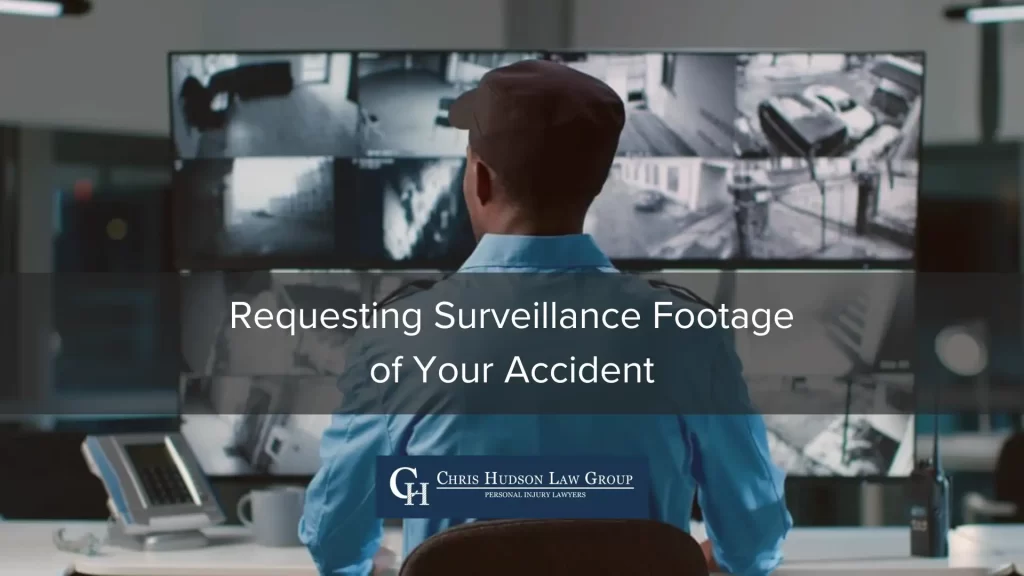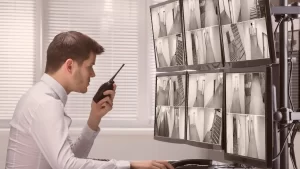
In many cases, surveillance footage of your accident can be used as indisputable proof of fault. Although obtaining surveillance footage from businesses, the government, and even other citizens can be difficult, it may be worth pursuing. Working with a personal injury lawyer from Chris Hudson Law Group will make the task much easier.
Gathering evidence after an incident that resulted in property damage or injury is one of the most critical factors in establishing liability for a personal injury claim. There is a variety of evidence that an experienced attorney will gather when preparing to file a personal injury claim or in preparation for trial, including:
- Police reports
- Photos of injuries and property damage
- Photos of the scene
- Witness testimony
- Expert witness testimony
- Medical invoices
- Surveillance footage
If you were injured in an accident that wasn’t your fault and believe the incident was caught on camera, contact an experienced attorney at Chris Hudson Law Group by calling us at (706) 863-6600 or online for a free and confidential consultation.
Read more: What Documents Do I Need for my Personal Injury Case?
How Long Do Security Cameras Keep Footage?
The length of time footage must be kept depends on who owns or has custody of the footage.
Building or departmental footage owned by the government: In Georgia, the government must retain all footage monitoring the activities and traffic of a department or building for 30 days unless there is a reported incident. If there is a reported incident, the footage must be kept until the claim is settled.
Footage from a body cam, dash cam, or drone camera: In Georgia, footage from a police officer’s body camera, dash camera, or obtained while using a drone camera must be retained for 180 days, except in limited circumstances that may be increased. For example, if the footage is part of a criminal investigation, shows a car accident, the detention or arrest of someone, or shows an officer using force, then the footage must be retained for a minimum of 30 months.
Non-governmental-owned footage: No law determines how long a private resident or business is required to keep their security footage. Some cameras store the footage on their internal storage and run on an automatic loop, meaning when the storage runs out, it will start recording over older footage. In contrast, cameras like ring cameras can send their footage for digital storage, and the length of time something is stored depends on whether the resident has a subscription or not.
Because it is impossible to know how long security footage will be stored if you are not getting the footage from a government body, it is important to contact an attorney immediately. Your attorney can begin the process of requesting and preserving the footage as soon as possible.
How to Obtain Security Footage
No one is obligated to give someone their security footage without a court order, but that doesn’t mean you shouldn’t ask. Sometimes, a business or private party will be willing to help if you merely ask them for the footage during the specific timeframe of the incident. However, not everyone will be eager to help.
obligated to give someone their security footage without a court order, but that doesn’t mean you shouldn’t ask. Sometimes, a business or private party will be willing to help if you merely ask them for the footage during the specific timeframe of the incident. However, not everyone will be eager to help.
If your request for the surveillance footage is denied, then you may want to have your attorney or law enforcement send a formal request that may outline why the footage is necessary. The last step for requesting security footage, which is not always necessary, is getting the court to issue a subpoena.
What Is a Subpoena?
A subpoena is an official order. It tells a person to show up somewhere or provide specific documents. A “subpoena duces tecum” asks for physical evidence. Someone who has the evidence is the target. Once there’s a subpoena, the person can ask the court to cancel or limit it.
Under Georgia law, a subpoena may be served:
- Anywhere within Georgia to someone over the age of 18 years old.
- Through registered or certified mail, with a return receipt constituting prima facie proof of service.
- To the party’s attorney.
If you’re injured due to someone’s mistake, and think a camera caught it, a lawyer can help get the footage.
Let’s say a business won’t share the footage of your incident. A court can issue a subpoena to a company director. This subpoena can be given to the director or their assistant, if they’re over 18.
Contact Us for a Free Consultation
If you’re injured due to someone’s mistake, and think a camera caught it, a lawyer can help get the surveillance footage of your accident. The skillful and experienced attorneys of Chris Hudson Law Group are prepared to pursue all pertinent evidence pertaining to your case. Our goal is to get you the maximum compensation you are eligible for. We only get paid when you do, and you don’t pay anything if we don’t win your case.
Call us today at (706) 863-6600 or contact us online for a free consultation.
Read more:
